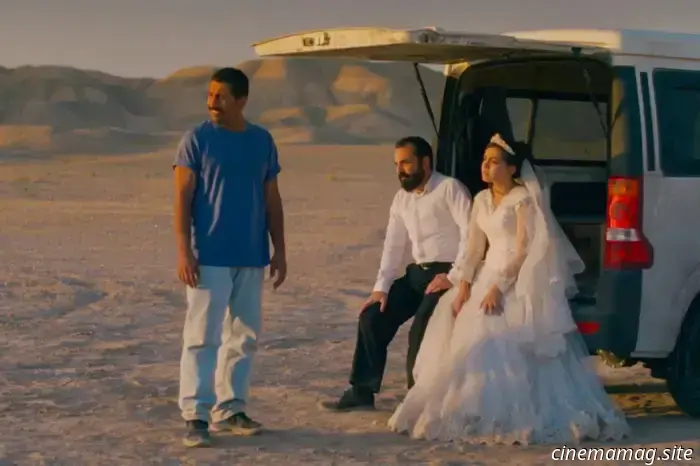
Cannes Review: It Was Just an Accident represents Jafar Panahi's most intense and provocative critique of Iran's government.
If you were faced with the individual who ruined your life and the lives of many others––a psychopath who tortured, raped, and murdered in the name of a brutal system––what would you choose to do? Would you seek revenge or achieve the seemingly impossible––forgive and release him? It Was Just an Accident, Jafar Panahi’s first film after being released from prison in Iran, revolves around that painful choice. The plot is straightforward, yet the emotional impact is hard to convey in simple terms. In an unforeseen twist of fate, four Iranians who served time for protesting the regime manage to kidnap the guard accountable for the horrific abuses they endured while incarcerated. After rendering him unconscious, they throw him into a van and drive around, contemplating their next steps. This entire journey is completed in less than a day. By the conclusion, Accident feels like a pressure cooker bursting with content. Panahi masterfully combines intense social commentary with incredible craftsmanship: while it is a heartbreaking plea for justice, this latest work also stands as a thrilling movie. It marks an extraordinary achievement.
Panahi was detained by Iranian authorities in July 2022 after signing an open letter condemning police brutality; he spent several months imprisoned. This was not his first encounter with (in)justice: in 2010, the government of former President Ahmadinejad accused him of “gathering and disseminating propaganda against the system,” resulting in a six-year prison sentence and a ban on leaving the country or making films for another 20 years. Undeterred, Panahi continued to release films that often served as direct responses to his situation––consider This is Not a Film, a self-portrait created during his house arrest while awaiting the results of an appeal, or No Bears, in which he acted as a director overseeing a film production occurring outside Iran. Like the character he portrayed, the real Panahi was unable to cross the border. When No Bears was unveiled in Venice, where it won a Special Jury Prize, an empty seat was left beside his name at the press conference.
This context makes Panahi’s appearance on the red carpet earlier this week in Cannes, where Accident premiered in official competition, particularly memorable for this edition. Unlike his fellow countryman Mohammad Rasoulof, who fled Iran in 2024 to escape a jail sentence for secretly producing The Seed of the Sacred Fig and has since lived in exile in Europe, Panahi had not escaped Iran. His ability to smile alongside his cast was solely due to authorities allowing it; his ban on filmmaking was lifted in April 2023, along with travel restrictions. Yet, I can’t help but wonder what lies ahead for him and how the regime will respond to his film. Arising from an auteur whose body of work has consistently explored themes of confinement and boundaries, there is something electrifying about Accident. It feels like the culmination of years of effort from Panahi, a bold call for justice that can finally resonate loudly and fearlessly.
Accident shouldn’t be simplified into mere agitprop. It carries no vindictive tone; rather, the delicate balance Panahi strikes between empathy and righteous anger is where his greatest achievement lies. While his alignment is clear, Accident repeatedly avoids easy moralizing in favor of a more radical notion: that the machinations of the regime also leave its perpetrators shattered. This theme is evident from the very first shot. Like a few of his earlier works, the film starts in a car, following a man (Ebrahim Azizi) as he drives his pregnant wife (Afssaneh Najmabadi) and young daughter (Delmaz Najafi) home. It’s late at night, the streets are desolate and eerie, suggesting that the bearded father may be on the run from something. However, once he arrives at a nearby warehouse, Accident reveals its twist. The family man has a prosthetic leg; upon hearing the sound of his footsteps, a worker, Vahid (Vahid Mobasseri), identifies him as Eqbal (nicknamed “Peg Leg”), the officer who tortured him for months in prison.
This surprising development illustrates Panahi’s talent for upending expectations, which aligns perfectly with a film that makes moral ambiguity its foundation. As Vahid was blindfolded during Eqbal’s torture, he drives around searching for someone to help him identify the man, leading him to Shiva (Maryam Afshari), a wedding photographer who recruits her ex-boyfriend Hamid (Mohamad Ali Elyasmehr), a bride-to-be (Hadis Pakbaten), and her fiancé (Majid Panahi) from a recent shoot. Despite the groom being ridiculed by Hamid as representing Iran’s “silent majority,” everyone involved has suffered at Eqbal’s hands and desires a say in his fate. Yet, as the final confrontation approaches, the group starts to fracture and their resolve for vengeance wavers; Panahi’s subtle direction and superb cast make

Other articles
 Universal Monsters: The Mummy #3 - Preview of the Comic Book
Next week, Image Comics and Skybound Entertainment will release Universal Monsters: The Mummy #3, and you can check out the official preview of the issue below. Helen has sought answers, and now she has found them. However, those in her vicinity might be cursed by the Mummy… Universal Monsters: The Mummy #3 will be available on Wednesday, […]
Universal Monsters: The Mummy #3 - Preview of the Comic Book
Next week, Image Comics and Skybound Entertainment will release Universal Monsters: The Mummy #3, and you can check out the official preview of the issue below. Helen has sought answers, and now she has found them. However, those in her vicinity might be cursed by the Mummy… Universal Monsters: The Mummy #3 will be available on Wednesday, […]
 Wellness takes a dark turn in the trailer for the horror-thriller Pins and Needles.
In anticipation of its VOD release this June, a trailer has been released for the Canadian indie horror-thriller Pins and Needles, written and directed by James Villeneuve. The story centers on Max, a diabetic student who becomes entangled in a perilous game of cat and mouse as her insulin supply quickly diminishes after her car breaks down and she [...]
Wellness takes a dark turn in the trailer for the horror-thriller Pins and Needles.
In anticipation of its VOD release this June, a trailer has been released for the Canadian indie horror-thriller Pins and Needles, written and directed by James Villeneuve. The story centers on Max, a diabetic student who becomes entangled in a perilous game of cat and mouse as her insulin supply quickly diminishes after her car breaks down and she [...]
-Movie-Review.jpg) Fountain of Youth (2025) - Film Review
Fountain of Youth, 2025. Directed by Guy Ritchie. Featuring John Krasinski, Natalie Portman, Eiza González, Domhnall Gleeson, Carmen Ejogo, Arian Moayed, Stanley Tucci, Laz Alonso, Benjamin Chivers, Daniel De Bourg, Steve Tran, Russell Balogh, and Michael Epp. SYNOPSIS: Two siblings who have become distant unite to search for the mythical Fountain of Youth. Armed with historical hints, they set out on a journey […]
Fountain of Youth (2025) - Film Review
Fountain of Youth, 2025. Directed by Guy Ritchie. Featuring John Krasinski, Natalie Portman, Eiza González, Domhnall Gleeson, Carmen Ejogo, Arian Moayed, Stanley Tucci, Laz Alonso, Benjamin Chivers, Daniel De Bourg, Steve Tran, Russell Balogh, and Michael Epp. SYNOPSIS: Two siblings who have become distant unite to search for the mythical Fountain of Youth. Armed with historical hints, they set out on a journey […]
 Marvel's Avengers: Doomsday and Secret Wars have been postponed.
With two of the largest films in history under its belt, Marvel Studios understands that patience is key. Their highly awaited projects, Avengers: Doomsday and Avengers: Secret Wars, require additional development time. Avengers: Doomsday has been rescheduled from May 5 to December 18, 2026. At the same time, the sequel […]
Marvel's Avengers: Doomsday and Secret Wars have been postponed.
With two of the largest films in history under its belt, Marvel Studios understands that patience is key. Their highly awaited projects, Avengers: Doomsday and Avengers: Secret Wars, require additional development time. Avengers: Doomsday has been rescheduled from May 5 to December 18, 2026. At the same time, the sequel […]
 Comic Book Sneak Peek - Star Trek: Lore War – Shaxs' Worst Day #1
IDW Publishing is set to release Star Trek: Lore War – Shaxs’ Worst Day #1 next week, and you can check out an early look with the official preview below... Created by the team that delivered the Ringo- and Eisner-nominated Shaxs’ Best Day, this installment promises an exhilarating adventure filled with witty ship shenanigans, relentless action, and […]
Comic Book Sneak Peek - Star Trek: Lore War – Shaxs' Worst Day #1
IDW Publishing is set to release Star Trek: Lore War – Shaxs’ Worst Day #1 next week, and you can check out an early look with the official preview below... Created by the team that delivered the Ringo- and Eisner-nominated Shaxs’ Best Day, this installment promises an exhilarating adventure filled with witty ship shenanigans, relentless action, and […]
 Funko has revealed the Pop! Vinyl figures of Silk Spectre II and Dr. Manhattan from Watchmen.
Funko has officially revealed two new Pop! Vinyl figures from Watchmen: Silk Spectre II and Dr. Manhattan, based on their roles in Zack Snyder’s 2009 film adaptation. Both figures are currently available for pre-order as Funko Shop exclusives; you can view them here… SEE ALSO: Zack Snyder’s Watchmen: An ambitious adaptation of a […]
Funko has revealed the Pop! Vinyl figures of Silk Spectre II and Dr. Manhattan from Watchmen.
Funko has officially revealed two new Pop! Vinyl figures from Watchmen: Silk Spectre II and Dr. Manhattan, based on their roles in Zack Snyder’s 2009 film adaptation. Both figures are currently available for pre-order as Funko Shop exclusives; you can view them here… SEE ALSO: Zack Snyder’s Watchmen: An ambitious adaptation of a […]
Cannes Review: It Was Just an Accident represents Jafar Panahi's most intense and provocative critique of Iran's government.
If you were given the man responsible for ruining your life and the lives of many others––a psychopath who committed torture, rape, and murder for a ruthless regime––what actions would you take? Would you seek revenge or attempt the unthinkable––forgive him and let him go? It Was Just an Accident, Jafar Panahi’s first film since his
